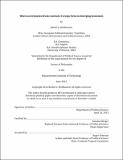When governments break contracts : foreign firms in emerging economies
Author(s)
Wellhausen, Rachel L. (Rachel Louise)
DownloadFull printable version (3.525Mb)
Alternative title
When governments break contracts : foreign investor-government relations in emerging economies
Other Contributors
Massachusetts Institute of Technology. Dept. of Political Science.
Advisor
Suzanne Berger.
Terms of use
Metadata
Show full item recordAbstract
Emerging economy governments commit to protect the property rights of foreign firms through a variety of contracts, from treaties to direct agreements. In an era of liberalized capital flows, these contracts are thought to be self-enforcing: the fear of capital exit compels governments to honor their obligations. But extraordinary variation in contract sanctity in countries around the world suggests the inadequacy of this view. This dissertation seeks to explain the varying pressures on emerging economy governments to honor or break contracts with foreign firms. I find that foreign firms' national origins play a key role in their contract sanctity. Firms of the same nationality are more likely to share political risks thanks to a variety of institutional and historical factors specific to the home-host country relationship. Co- national firms can also uniquely access diplomatic support. Shared risks and resources make firms more likely to act in ways costly to the host government when a co-national firm's contract is broken. In contrast, firms are likely indifferent to breach with firms of another nationality. These firm-level reactions generate a counterintuitive result in the host country as a whole. The more diverse foreign firms' national origins, the more space a host government has to compromise one national group's contract sanctity without threatening broader capital access. Using quantitative analysis, I demonstrate that firms differentially draw down FDI after government breach of contract with co-national firms. I also use over 130 interviews with foreign investors in Ukraine, Moldova, and Romania to demonstrate that co-national actors' protests are stronger and more effective when the foreign investor community is less nationally diverse. The theory offered here takes seriously the bilateral relationship embedded in each foreign investment transaction. Far from having faded from relevance in a world of economic globalization, bilateral relations shape foreign firm and diplomatic responses to breach. Because host governments breach contracts with certain foreign firms and are met with indifference by others, nationality diversity can be a liability to investors while providing an opening for governments to prioritize other goals over the property and preferences of foreign capital.
Description
Thesis (Ph. D.)-Massachusetts Institute of Technology, Dept. of Political Science, 2012. This electronic version was submitted by the student author. The certified thesis is available in the Institute Archives and Special Collections. Cataloged from student-submitted PDF version of thesis. Includes bibliographical references (p. 283-292).
Date issued
2012Department
Massachusetts Institute of Technology. Department of Political SciencePublisher
Massachusetts Institute of Technology
Keywords
Political Science.